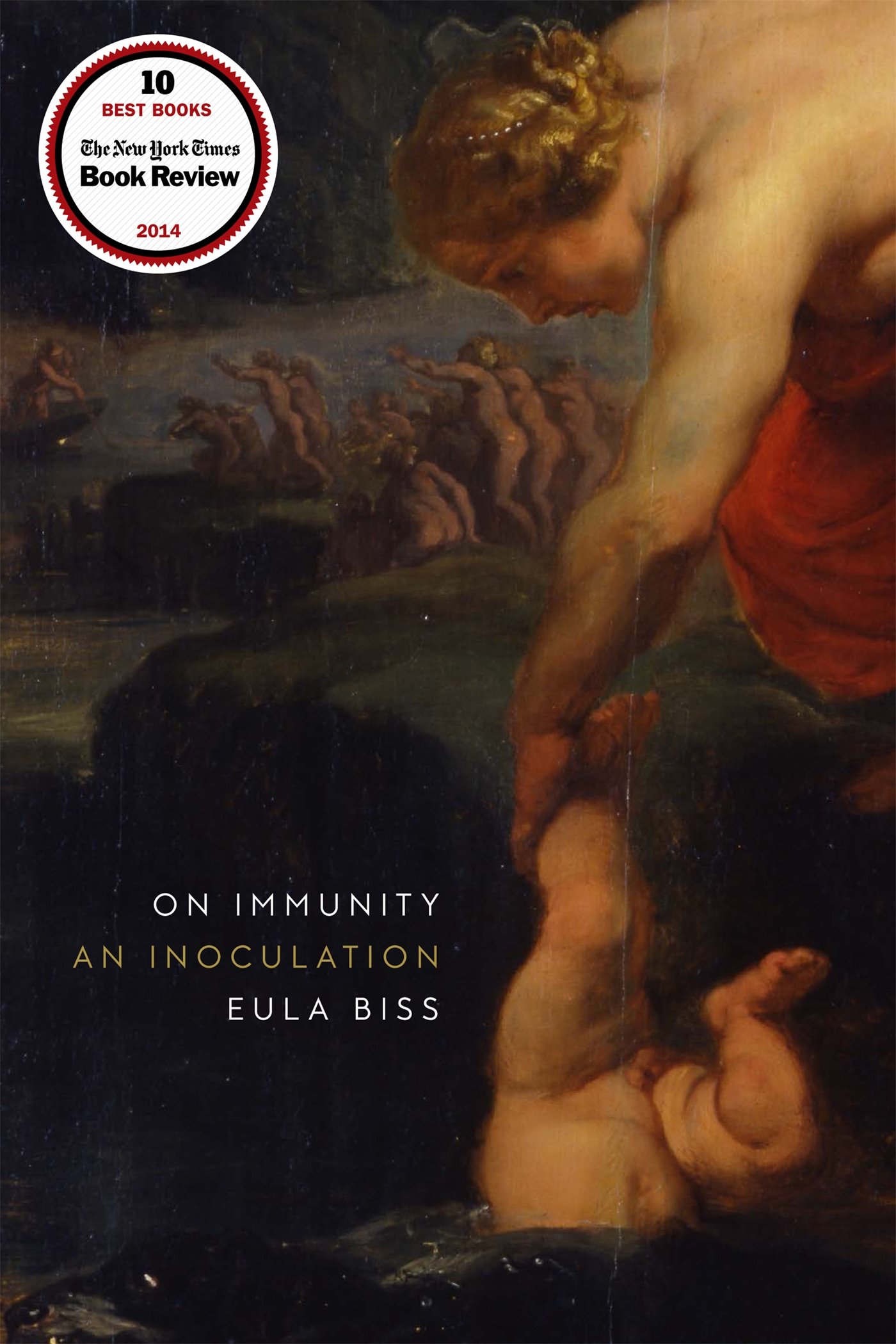On Immunity Summary
6 min read ⌚

MicroSummary: In “On Immunity: An Inoculation,” Eula Biss separates the facts from the fiction and makes a great case for the benefits of vaccination, while giving a thorough explanation for the reasons behind the anti-vaccination movement as well.
An Inoculation
So, you’re a new parent and you’re wondering if you should take your child to the vaccination center? Too many conflicting opinions and advices?
Eula Biss is here to clear things up.
And we have the summary of her fairly popular book, “On Immunity.”
Who Should Read “On Immunity”? And Why?
The anti-vaccination movement seems to be growing. And doctors and scientists are constantly warning that this may lead to serious consequences. Want to know who’s right? Then “On Immunity” is the right book for you. Even better: want to solve your dilemma of whether you should vaccinate your child. Read on, contrast and compare.
About Eula Biss
 Eula Biss is an American non-fiction writer and editor at Essay Press. A Guggenheim Fellow, she currently teaches at Northwestern University.
Eula Biss is an American non-fiction writer and editor at Essay Press. A Guggenheim Fellow, she currently teaches at Northwestern University.
She has authored three books. “On Immunity” is her most recent one. Before that, she has also written “The Balloonists,” and “Notes from No Man’s Land.”
“On Immunity Summary”
If you have watched “Troy,” you are probably already familiar with the story of Achilles.
If not – here’s a quick recap:
Achilles was the foremost Greek hero and the central character of the Trojan War. He, too, was someone’s son. And that someone was a goddess named Thetis, who didn’t want to come to terms with the fact that her son was only half a god.
So, she decided to make him immortal!
She dipped him into the waters of the underworld river Styx and asked the god of fire to make him an impenetrable shield.
Neither worked: Achilles was killed when Paris shot him in the heel. It was the only vulnerable place in Achilles whole body, because Thetis held him by his heels when dipping him in the waters of Styx! Now go back to the image of this book’s cover above.
OK, you got that.
But, wait a minute: how is this story related to vaccines?
Well, according to Eula Biss, the story preserves, in the form of a myth, the anxiousness parents feel for the safety of their children. In addition to the crippling fear they feel that no matter what they do, they will not be able to protect them.
And that’s where the problem with vaccines comes into our discussion.
The question is whether parents can protect their children by vaccinating them, or, quite contrary, by skipping vaccination. And the problem is, it’s hard to get an honest answer to this query in a world infested with half-truths.
Luckily, “On Immunity” gives a heck of an objective try!
First of all, Biss doesn’t shy away from telling us that there are few historical episodes which, understandably, can make even the most rational people shiver.
For example, there’s the tetanus-poisoned smallpox vaccine affair in New Jersey. It resulted in the death of nine children in 1901. Then, there’s the notorious 1998 study by Andrew Wakefield, which purported a direct connection between MMR vaccines and autism. Wakefield’s paper was subsequently proved to be fraudulent, but its effects linger on.
Moving on to 2011, a Scandinavian study suggested that H1N1 vaccines may be responsible for teenage narcolepsy. Additionally, some suspect that the hepatitis B vaccine may cause multiple sclerosis. And few vaccines even cause theoretically deadly allergic reactions!
Now, that’s a lot to take!
But, interestingly enough, as Biss tries to show, these events are only a small part of the problem with vaccines and vaccination. The bigger part is in no way related to reality, but it’s down to stereotypes and superstitions!
Just think of the language we use when it comes to vaccines! “Jabs” in Britain, “shots” in the USA! Neither sounds too friendly, right? Well, there’s a reason for that: vaccines have continually and unreasonably been associated with something negative.
Take, for example, the HPV vaccines. They are given to young girls in order to protect them from uterine cancer once they become sexually active. However, many parents don’t like their daughters taking them: it seems too impure to them!
Speaking of impure:
The hepatitis B vaccine never had a good reputation. Because, the disease is most frequently transferred via sexual intercourse or intravenous drug use, it’s associated with drug users and prostitutes. Biss herself experienced this when her physician told her that the vaccine is not necessary for her child and it’s for “inner city” people only!
And on top of some vaccines’ bad reputation, many of the Western countries which provide it have a bad reputation themselves!
That’s exactly what went wrong with the Polio Eradication Campaign in Nigeria in 2013. The uneducated people there stopped taking their children to vaccinations, because their leaders convinced them that the vaccines was a Western plot to sterilize or infect Muslim children.
And this is the crux of the matter!
Vaccination only works if most of the people in an area of interest are vaccinated. It’s called herd immunity and, unfortunately, it means that, unless the majority is vaccinated, everybody loses.
The vaccinated especially.
Key Lessons from “On Immunity”
1. If You Don’t Like Vaccines, You Don’t Like Them for the Wrong Reasons
2. The Benefits of Vaccines Are Incomparably Superior to the Detriments
3. Herd Immunity: Vaccinations Work Like Elections
If You Don’t Like Vaccines, You Don’t Like Them for the Wrong Reasons
There are few cases when vaccination has gone wrong. There are few other where sinister people have used it for sinister purposes. But, almost nobody talks about these well-documented cases.
What everybody does talk about is not scientific. Not to mention – altogether wrong! Vaccines are neither violent nor promote promiscuity. They are not a new form of colonialism or disturbing ploys to spread autism.
In fact, they are not even unnatural!
The Benefits of Vaccines Are Incomparably Superior to the Detriments
Let’s crunch the numbers:
Measles leads to encephalitis in one in 1,000 cases. However, MMR vaccines may lead to encephalitis only in one in 3,000,000 cases.
Diphtheria leads to death in one in five children. On the other hand, diphtheria vaccines cause serious problems only in one in 1,000,000 cases.
Chickenpox vaccines cause almost no side effects. Instead, chickenpox itself leads to death.
Herd Immunity: Vaccinations Work Like Elections
It would be great if there were no risks at all! But, even climbing down the stairs has risks!
However, when it comes to vaccination, there’s a catch:
It’s not only about you and your child! Namely, herd immunity can be generated only when the majority of population is vaccinated. So, it’s just like voting: if you don’t go to the ballots, even though you know only one of the two candidates is good, you can contribute to the election of the bad guy!
So, are you going to stay at home?
Like this summary? We’d Like to invite you to download our free 12 min app, for more amazing summaries and audiobooks.
“On Immunity” Quotes
Wealthier countries have the luxury of entertaining fears the rest of the world cannot afford. Share on X But risk perception may not be about quantifiable risk so much as it is about immeasurable fear. Share on X The problem has not been finding a place where I belong, which is how a children's book might tell it, but of finding ways of insisting on belonging nowhere. Share on X A trust—in the sense of a valuable asset placed in the care of someone to whom it does not ultimately belong—captures, more or less, my understanding of what it is to have a child. Share on X I suspect that Coca-Cola, unpoisoned, is more harmful to our children than vaccination. Share on XOur Critical Review
In 2014, “On Immunity” was voted to be one of the 10 best books by the “New York Times” and was Mark Zuckerberg book club selection for February 2015. But, we suppose that the best recommendation about the book was tweeted by Bill Gates. He called it “a great book that is not out to demonize anyone who holds opposing views.”
And you know us: we like such books. They separate the facts from the fiction, and the myths from reality. And when it comes to vaccines – boy, we need such disinfection!
Emir is the Head of Marketing at 12min. In his spare time, he loves to meditate and play soccer.







